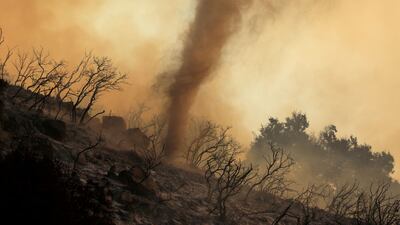Flood, fire and drought fuelled by climate change could take an enormous bite out of the US federal budget costing $2 trillion per year by the end of the century, the White House said in its first ever such assessment on Sunday.
The Office of Management and Budget assessment, tasked by President Joe Biden last May, has found the upper range of the hit by climate change to the budget by the end of the century, which could total 7.1 per cent in annual revenue loss, equalling $2tn a year in today's dollar value.
"Climate change threatens communities and sectors across the country, including through floods, drought, extreme heat, wildfires and hurricanes [affecting] the US economy and the lives of everyday Americans," Candace Vahlsing, an OMB climate and science official, and its chief economist Danny Yagan, said in a blog.
"Future damages could dwarf current damages if greenhouse gas emissions continue unabated."
The analysis found that the federal government could spend an additional $25 billion to $128bn annually on expenditures such as coastal disaster relief, flood, crop and healthcare insurance, wildfire suppression and flooding at federal sites.
Only last year, a record heatwave and drought in the US West gave rise to two enormous wildfires that tore through California and Oregon and were among the largest in the history of both states.
The severe drought that has gripped parts of the US West since mid-2020 is likely to persist or worsen this spring, the National Oceanic and Atmospheric Administration said in March.
US military bases, including Offutt Air Force Base in Nebraska and Tyndall Air Force base in Florida, have suffered billions of dollars in damage in recent years from floods and hurricanes.
The OMB said increased wildfires could boost federal fire suppression costs between $1.55bn to $9.6bn annually. About 12,200 federal buildings and structures could be flooded as seas rise with replacement costs of nearly $44bn.
Absent policies and actions to slow the rate of greenhouse gas emissions means world temperatures are on pace to rise more than 2°C above pre-industrial levels by the end of the century.
The grim OMB assessment came hours before publication of a long-awaited UN climate science panel report on methods of curbing the emissions, a study that some scientists say may downplay certain potentially devastating scenarios due to its consensual nature in which 195 governments had to sign off on it.
President Biden, a Democrat who positioned himself as a champion for tackling climate change when he took office in January 2021, has been forced to support hiked domestic oil drilling and liquefied natural gas exports to Europe as Russia's war on Ukraine spikes energy inflation.
The president's "Build Back Better" bill, which contained hundreds of billions of dollars in funding to fight climate change and support clean energy, has been stalled in the narrowly-divided Senate by Republicans and West Virginia's conservative Democrat senator Joe Manchin, founder and partial owner of a private coal brokerage.
Mr Biden late last month submitted a $5.8tn budget plan to Congress with a focus on deficit reduction in an apparent overture to Mr Manchin who has said he could not vote for the bill because it would worsen deficits. President Biden's budget plan calls for nearly $45bn to tackle climate change in fiscal year 2023, an increase of nearly 60 per cent over fiscal year 2021.

















